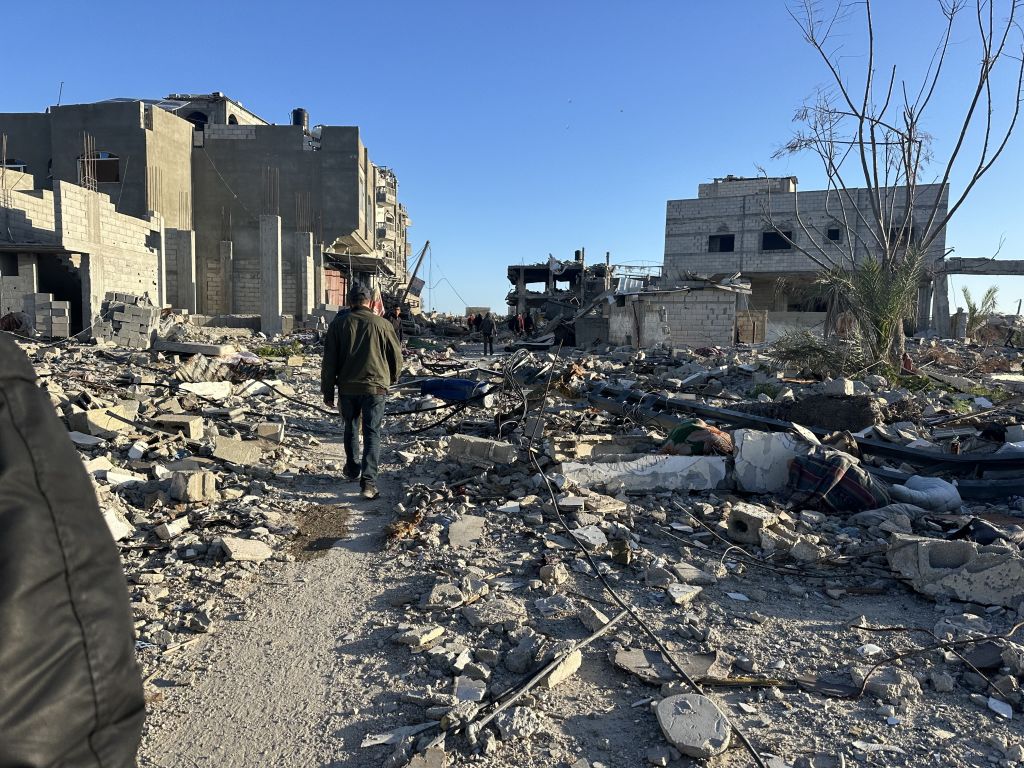If I were a Palestinian struggling among the rubble in Gaza, I would probably think Israel is committing genocide. If I were a German hiding in Dresden or a Japanese civilian outside Hiroshima in 1945, I’d probably feel the same. But neither of those were genocide.
Genocide has a specific definition, “the deliberate and systematic extermination of a national, racial, political, or cultural group.” The term was coined by Rafael Lemkin, a Polish Jew, in response to Winston Churchill’s observation about the Holocaust, “We are in the presence of a crime without a name.”
In fairness, the images of war, particularly this one, can seem genocidal. But this stems in no small part from Hamas’ strategy. The terrorists cannot win, and will not fight, a conventional war; Palestinian civilians don’t get bomb shelters, only Hamas fighters do.
The point remains: If supposedly all-powerful Israel were bent on genocide, it is oddly bad at it. According to the Palestinian Central Bureau of Statistics, the Palestinian population has grown more than eightfold since Israel’s founding, while the population of the Gaza Strip has increased 600 percent since 1960.
So maybe genocide was never Israel’s intent in the first place?
Of course, you can’t say the same about Hamas and Hezbollah. They’re open about their goal of eliminating Israel.
Even denunciations of Israel often undermine the genocide claim. Israel is condemned for inadequate warnings about attacks and insufficient humanitarian support to Gaza. But if genocide were the aim, why drop warning leaflets or provide aid at all?
Alas, it’s a sign of the times that absolving Israel of Hitlerite genocide counts as an outrageous defense of Israel. (It’s a bit like when I tell some of my fellow Trump critics that Donald Trump isn’t Hitler and they react like I’m rushing to his defense.) There’s plenty to criticize Israel about without resorting to genocide accusations. And plenty of very negative labels can be defensibly, or at least arguably, be used to criticize Israel’s actions in Gaza—inhumane, excessive, wanton—without mischaracterizing its intent.
The claim that Israeli policy toward Palestinians is racist and genocidal is very old, with deep roots in Soviet propaganda along with Holocaust denial. Mahmoud Abbas, the Palestinian leader in the West Bank, wrote his doctoral dissertation on this garbage at Moscow’s Patrice Lumumba University. Vladimir Putin, whose war against Ukraine does fit the U.N.’s definition of genocide, has revived this tactic to distract and divide the West.
All this is worth noting, and not just to demonstrate the pretextual nature of the accusation and highlight the double standard applied to Israel at the U.N. and elsewhere. In recent years, American journalists have anguished over the problems of disinformation in general and Russian disinformation in particular. There was a related, robust debate over whether journalists should call Trump’s lies “lies.” But on any given day, politicians, pundits, and activists, routinely accuse Israel of genocide, even “massive genocide,” with little to no pushback from the press. In fact, the opposite is more common. The press often leaps at allegations, often initially made by Hamas, that seem to confirm the genocide charge, only to have to later retract once the facts emerge.
Loose assertions of genocide have consequences, none good. Genocide is, understandably, one of those concepts that psychologically arouses a sense of total moral authority in its opponents. Any form of resistance can be justified, which is why so many people have bent over backward to justify or “contextualize” the horror of Hamas’s October 7 attack. It can even lead disturbed young men to set themselves ablaze to protest it—and for alleged lovers of peace to celebrate those protests.
Second, this mindset fosters collective guilt. Jews around the world, regardless of their attitudes toward Israel or Zionism, are being targeted for abuse and discrimination simply for their alleged complicity in genocide. Many extremists subscribe to a moral tautology that says Israel is like Nazi Germany so therefore if you support Israel, you’re akin to a Nazi and since Jews support Israel, Jews, or “Zionists,” are fair game for all manner of harassment and exclusion.
Finally, if Israel is going to be accused of genocide regardless of its actions, it has that much less incentive to show restraint in its effort to defeat an enemy that is actually genocidal.
Indeed, it’s worth noting that those most loudly calling for a ceasefire to stop Israeli genocide often fall short of demanding that Hamas surrender. That would stop the bloodshed-by-any-name tomorrow, but apparently that’s a bridge too far for those outraged by genocide.









Please note that we at The Dispatch hold ourselves, our work, and our commenters to a higher standard than other places on the internet. We welcome comments that foster genuine debate or discussion—including comments critical of us or our work—but responses that include ad hominem attacks on fellow Dispatch members or are intended to stoke fear and anger may be moderated.